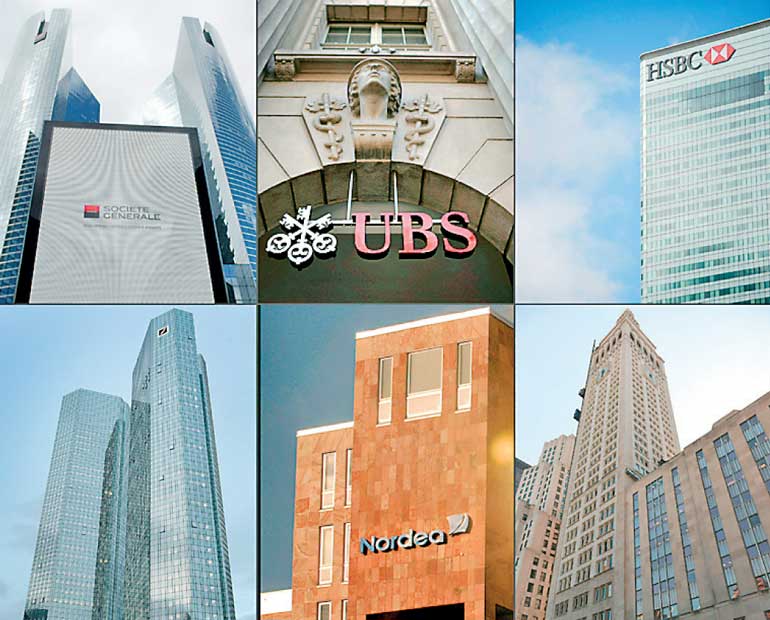Monday Feb 23, 2026
Monday Feb 23, 2026
Wednesday, 6 April 2016 00:00 - - {{hitsCtrl.values.hits}}
 This combination of files pictures created on 5 April shows (from upper left) the headquarters of French banking group Societe generale, the headquarters of Swiss banking giant UBS, the London offices of HSBC banking group, the headquarters of German company Deutsche Bank, the headquarters of Swedish banking group Nordeaand the Swiss bank Credit Suisse headquarters in New York, the names of which are featured in a massive leak of documents, some of which reveal hidden offshore assets involving Panama-based law firm Mossack Fonseca - AFP
This combination of files pictures created on 5 April shows (from upper left) the headquarters of French banking group Societe generale, the headquarters of Swiss banking giant UBS, the London offices of HSBC banking group, the headquarters of German company Deutsche Bank, the headquarters of Swedish banking group Nordeaand the Swiss bank Credit Suisse headquarters in New York, the names of which are featured in a massive leak of documents, some of which reveal hidden offshore assets involving Panama-based law firm Mossack Fonseca - AFP
Reuters: Credit Suisse and HSBC, two of the world’s largest wealth managers, dismissed on Tuesday suggestions they were actively using offshore structures to help clients cheat on their taxes.
Their comments came a day after a leak of four decades of documents from a Panamanian law firm that specialises in setting up offshore companies showed widespread use of those instruments by global banks on behalf of their clients and triggered a raft of government investigations across the world.
The so-called “Panama Papers”, revealed through an investigation by the International Consortium of Investigative Journalists (ICIJ), exposed financial arrangements of politicians and public figures including friends of Russian President Vladimir Putin, relatives of the prime ministers of Britain, Iceland and Pakistan, and the president of Ukraine.
Credit Suisse CEO Tidjane Thiam, who is aggressively targeting Asia’s wealthiest for growth, said his bank was only after lawful assets.
“We as a company, as a bank only encourage the use of structures when there is a legitimate economic purpose,” Thiam, who took the helm at Switzerland’s second-largest bank last year, told a media briefing.
Separately, HSBC said the documents pre-dated a thorough reform of its business model. “The allegations are historical, in some cases dating back 20 years, predating our significant, well-publicised reforms implemented over the last few years,” said Gareth Hewett, a Hong Kong-based spokesman for HSBC.
HSBC and Credit Suisse were named among the banks that helped set up complex structures that make it hard for tax collectors and investigators to track the flow of money from one place to another, according to ICIJ, which based its reports on the leaked documents from the Panamanian law firm, Mossack Fonseca.
More than 500 banks, their subsidiaries and branches registered nearly 15,600 shell companies with Mossack Fonseca, according to ICIJ’s analysis of the records. The vast majority of them were created since the 1990s, ICIJ said on its website.
Thiam, in Hong Kong to attend Credit Suisse’s annual Asian Investment Conference, acknowledged the Swiss wealth manager does use offshore financial structures, but only for very wealthy customers with assets in multiple jurisdictions, and it did not support their use for tax avoidance or allow them without knowing the identities of all those concerned.
“We do not condone structures for tax avoidance,” he said. “Whenever there is a structure with a third party beneficiary we insist to know the identity of that beneficiary.”
Credit Suisse agreed in May 2014 to pay a $2.5 billion fine in the United States for helping rich Americans evade taxes. Several Swiss-based wealth managers, including cross town rival UBS Group AG, also had to pay large fines in the United States for the same reason.
HSBC, which also had wealth management operations in Switzerland, agreed in 2012 to pay $1.92 billion in U.S. fines, mainly for allowing itself to be used to launder drug money flowing out of Mexico.
Reuters: Authorities across the globe have opened investigations into the activities of the world’s rich and powerful after a cache of leaked documents from a Panamanian law firm showed possible wrongdoing using offshore company structures.
The “Panama Papers” have cast light on the financial arrangements of high profile politicians and public figures and the companies and financial institutions they use for such activities. Among those named in the documents are friends of Russian President Vladimir Putin and relatives of the leaders of China, Britain, Iceland and Pakistan, and the president of Ukraine.
Leading figures and financial institutions responded to the massive leak of more than 11.5 million documents with denials of any wrongdoing as prosecutors and regulators began a review of the reports from the investigation by the U.S.-based International Consortium of Investigative Journalists (ICIJ) and other media organisations.
Following the reports, China has moved to limit local access to coverage of the matter with state media denouncing Western reporting on the leak as biased against non-Western leaders.
France, Australia, New Zealand, Austria, Sweden and the Netherlands are among nations that have commenced investigations, and some other countries, including the United States, said they were looking into the matter.
Mossack Fonseca, the Panamanian law firm at the centre of the leaks, has set up more than 240,000 offshore companies for clients around the globe and denies any wrongdoing. It calls itself the victim of a campaign against privacy and claims media reports misrepresent the nature of its business.
In a printed statement given to Reuters by a staff member at Mossack Fonseca’s Hong Kong office on Tuesday, the firm said it has never been charged with or formally investigated for criminal wrongdoing in its nearly 40 years of operation.
“We do not advise clients on how to operate their businesses. We don’t link ourselves in any way to companies we help incorporate,” the firm said in the statement.